Support strong Canadian climate journalism for 2025
As Hurricane Irma ripped into Florida on the weekend, bringing with it raging winds and water that stormed Miami's core, the world's leading climate change organization wrapped up several days of meetings in Montreal with a pledge to put consumer behaviour under the microscope.
The chairman of the Intergovernmental Panel on Climate Change (IPCC), Hoesung Lee, said this was among a range of issues to be examined as the organization seeks to offer governments new policy options to avoid ecological disasters. He also noted the relevance of Hurricanes Irma and Harvey in his opening comments to media Sunday night, while summarizing the organization's agenda for the next two years.
At the top of the United Nation panel's to-do list is drilling down into regional impacts of and adaptation to climate change, as well as answering the demands of governments who want more information about how climate change and extreme weather events will affect their regions.
Lee noted that the IPCC would also be looking at the latest evidence regarding how human behaviour and consumption is affecting climate change. This is something that the United Nations panel has never done since it was first created in 1988, he said.
"It’s the first time ever that (the) IPCC (has) addressed the demand side of this whole problem," Lee said. "Demand side here means consumer demand, consumption behaviour, behavioural change — (the) human side aspect of climate change problems. In that regard, scientific disciplines addressing the human nature, human dimensions of this problem will be invited to assess the literature in this area.
"So we think that improving the understanding about what motivates people, what motivates changes in behaviour is a very important factor that policy makers may utilize for their development of policies."
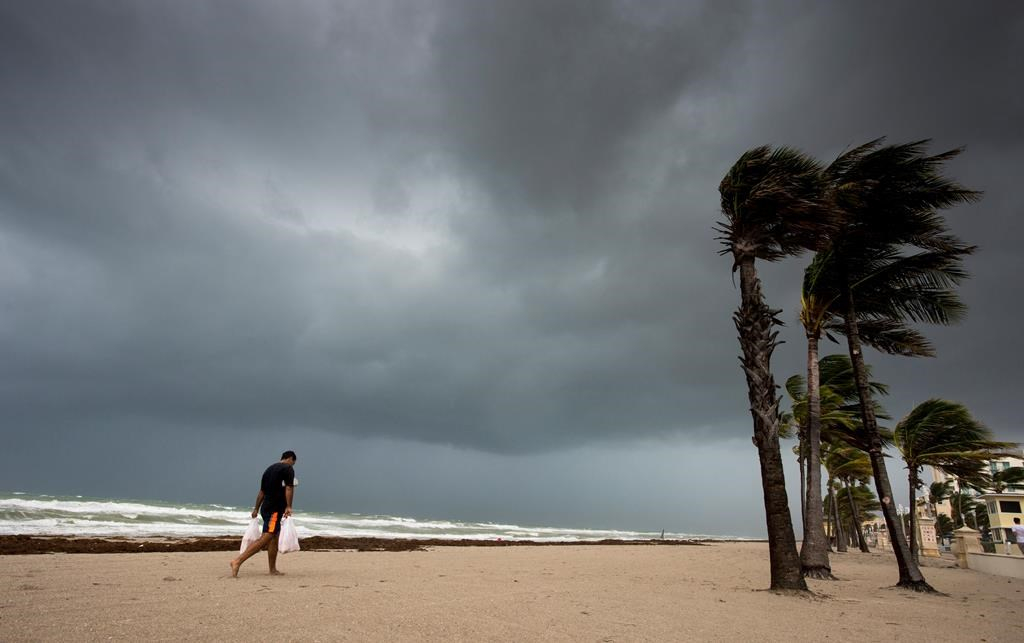
Scientists say that human consumption of fossil fuels such as gasoline and coal for energy releases heat-trapping carbon emissions into the air that contribute to climate change and a wide-range of impacts that could include extreme weather events.
But scientists also chose their words carefully in linking the previous week's disastrous hurricanes to climate change.
"The problem is that one can never say this particular event would or would not have happened in the absence of climate change," said Gregory Flato, a Canadian government scientist who leads one of three IPCC working groups. "For example, hurricanes have been a feature of the earth's system for a very long time. And they will continue to be a feature of the earth's system. So one can't say that any particular hurricane was the result of changing climate. What we can talk about is the changing risks of hurricanes, and the changing characteristics of those hurricanes."
The first working group of the IPCC looks at the latest scientific evidence on the causes of climate change, while the second group examines impacts, adaptation and vulnerability, while the third working group examines scientific evidence about how to mitigate climate change.
Flato, who works at Environment and Climate Change Canada, leads the first IPCC group that focuses on the physical science basis of climate change.
"So as the climate warms, the atmosphere is able to hold more moisture, one anticipates that the rainfall associated with these large storms will be greater, there's also an expectation that as the sea surface temperatures increase, that the intensity of very intense hurricanes will become larger," Flato said. "So one can say something about the features of hurricanes and... other extreme events, and potentially about how their statistics might change and how the risk of those might change, but one can never say anything about an individual event (being) attributed exclusively to climate change or not."
What difference half a degree makes
The IPCC left Montreal with an outline for its sixth assessment report, which will deal explicitly with what happens if the earth's temperature rises 1.5 degrees Celsius above pre-industrial levels.
Hans-Otto Pörtner, who leads the IPCC's second working group, noted the target — 1.5 degrees — and the focal point of future study "does not come out of the sky," but builds on existing knowledge and conversations between policy makers and scientists in 2015.
"It's very clear that there's an increase in risk as we move from 1.5 to 2," degrees above pre-industrial levels, Pörtner said. "We would stay in a safer world if we managed to keep climate change at the 1.5 degree target."
Patrick Bonin, a Greenpeace campaigner, observed the week's closed-door meetings in Montreal.
"The IPCC is clear about the fact that 2 degrees is a barrier we shouldn't pass. It needs to be as close as possible to 1.5. And I think this is part of the new reality that the work of the IPCC is more relevant and important than ever in order to raise awareness among decision-makers because the decisions are based on science."
Bonin told National Observer that, with Hurricane Irma being broadcast across television news stations, countries are taking climate change very seriously.
"Countries are interested (in having) as much information as possible," Bonin said.
Bonin added the IPCC is responding to countries' demands for more information and policy options — but the organization needs more money.
Trump called climate change a hoax
The IPCC was created in 1988 by the United Nations and the World Meteorological Organization "to provide policymakers with regular assessments of the scientific basis of climate change, its impacts and future risks, and options for adaptation and mitigation."
Its role is not to make policy, but to collect and synthesize the information that governments need to make policy. It also relies on its 195 member countries for funding.
Under President Donald Trump, the United States administration is expected to stop funding the international climate science organization, making for a loss of about $2-million.
"The funding from the United States is a matter for the United States government to announce," IPCC spokesman Jonathan Lynn said Sunday. "We haven't been formally notified.
In the past, Trump has described climate change as a hoax perpetrated by China to steal American manufacturing jobs. His administration has also proposed budget cuts that would shift U.S. government resources away from research and monitoring needed to adequately track and mitigate climate change.

Lynn emphasized countries decide for themselves when and if they will support the IPCC.
"Money comes in as (a) voluntary contribution, we don't know when it's going to come. We invite all our member governments to contribute to the IPCC and we will be grateful for any contributions that we get from any of them."
On the weekend Canada committed to doubling its support for the IPCC, upping its annual contribution of $150,000 to $300,000 through 2022. IPCC members applauded the announcement, which makes for guaranteed funding through a full cycle of its research.
"If all other countries are doing the same then their work will be way easier, and they won't have to worry about (the) budget, which is incredible that they still have to do," Bonin said.
McKenna urged countries to work together
Before the conference, Canadian Environment and Climate Change Minister told National Observer that she was hopeful that every country would participate in sharing their scientific expertise.
"When it comes to good science we all need to be working together," McKenna said in Gatineau, Que.
McKenna made those comments on Aug. 31, after speaking to an elementary school classroom about climate change and launching a new federal website to encourage children to discuss the issue.
"The United States have been doing very good work on the science behind climate change as are other countries and so we’re really hopeful that every country will understand the importance of working together."
McKenna said in a statement on Saturday that Canada's additional support would help climate scientists around the world "assess vital research, and give governments the tools to make smart, evidence, based decisions for our future."

As Miami blasted by hurricane, IPCC wants more studies of cities
IPCC delegates will return to Canada in March, 2018, for a city-oriented conference in Edmonton, Alta.
As many as 700 researchers, scientists, policy-makers, city planners, and others will meet in Canada's oil country in the new year to more specifically address gaps in shared knowledge on cities, climate change, and how the urban centres that account for between 70 and 80 per cent of the world's greenhouse gas emissions will adapt for the future.
Diana Ürge-Vorsatz, who will co-chair the Edmonton conference, said the scientific community has more evidence to gather on cities, and cities have a lot to learn from each other.
Ürge-Vorsatz is a professor at Central European University and director of the Center for Climate Change and Sustainable Energy Policy.
"Certainly extreme weather impacts each city, whatever region, equally. When we have an extremely intense hurricane, it virtually doesn't really matter if you're in a very rich country or a very poor country," she told National Observer. "Nevertheless, in general we can state that the vulnerability of the cities in the Global South, or generally in poorer countries or poorer cities, is much higher, to the same risk."
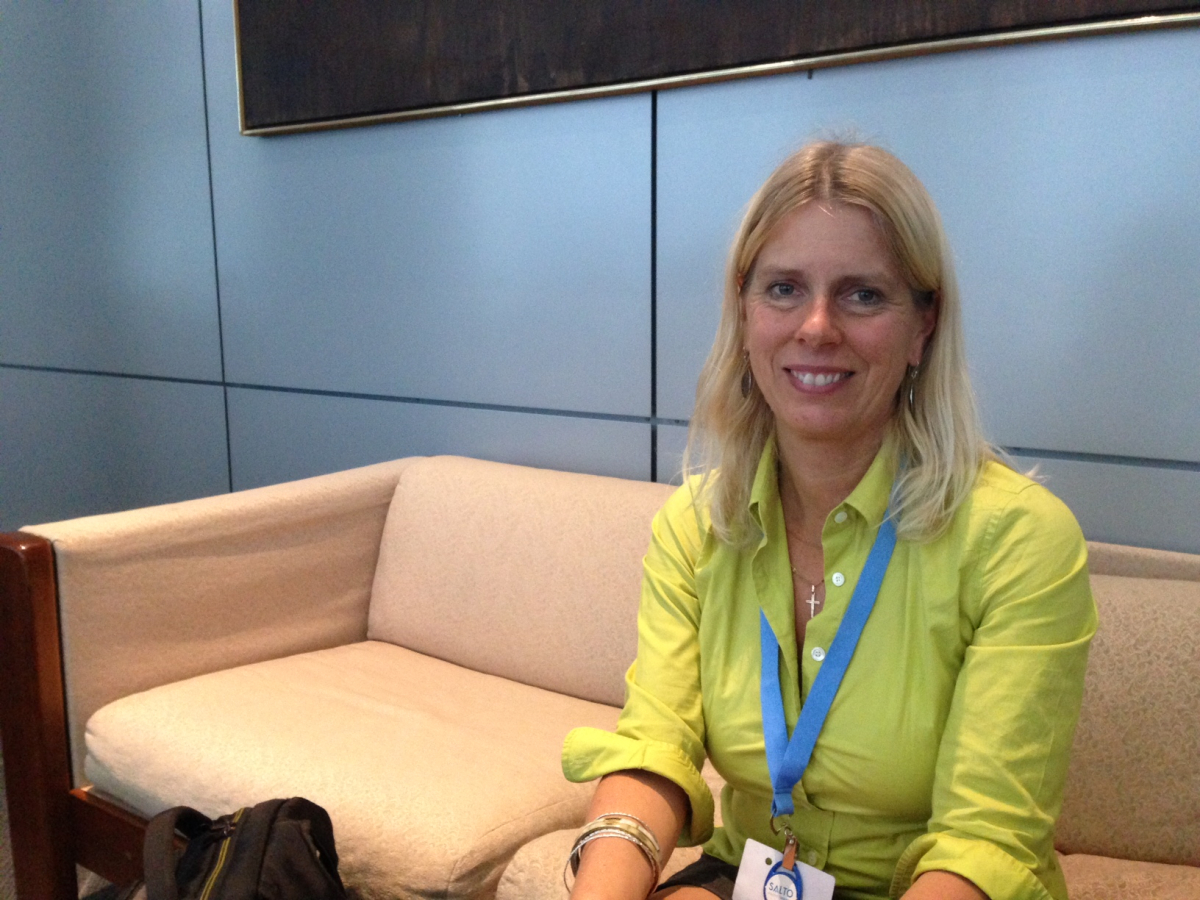
So, she said, the question then turns to how cities adapt to climate challenges, how they mitigate risks.
"It's not enough just to look at the acutal physical impacts of climate change, which is clear -- extreme weather events, floods, fires, storms ... droughts," Ürge-Vorsatz said. "But also, what infrastructure is available to different cities?"
The opportunity to learn is not one-way, she added, but multi-directional.
The aim of the Edmonton conference will be to treat cities as systems, to take stock of knowledge already in place (including academic research and research carried out by cities and NGOs), understand what's missing, and then set a new research agenda for the IPCC's seventh assessment cycle.



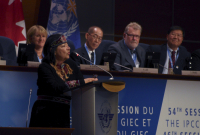
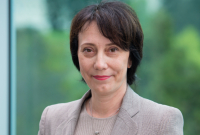
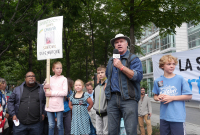
Comments
A copy of my recent communication with 3 regional MPs - relevant to the human factor:
Hi Nathan, Richard and Wayne,
It was a pleasure to meet you in person during your recent Nelson event. I mentioned to you some thoughts about a fundamental and underlying issue paralyzing our potential action on climate change and you expressed an interest in a follow up from me.
I will start with a bit of background material you may not have seen.
https://qz.com/1069298/the-3-of-scientific-papers-that-deny-climate-cha…
https://www.brookings.edu/blog/planetpolicy/2017/09/18/why-the-wiring-o…
Then there is an open letter I’ve posted in a few places:
I experienced previous southern interior of B.C. “extreme” fire seasons in 2003 and 2015. They were scary and uncomfortable at the time. Nonetheless, this summer, I noticed my emotional non-readiness to take in heavy smoke from hundreds of kilometers away, uncomfortable heat and blustering gusts of hot winds; these felt like a fore-taste of fast moving blast-furnace kind of 2 - kilometer -“jumping” fires that are occurring.
My background working in clinical mental health for 20 years , having the privilege of experiencing how our human minds function behind the masks we wear, even with oursleves, confirmed that I am not alone in this sense. We are all biased in justifying what we wish to believe. There is a disconnect between what information we may have access to and what we make of it, based on experience and emotion rather than logic. And what we wish to believe. In his book “Descartes Error", Damasio details the actual rather than theoretical consequences of various brain injuries disconnecting or losing specific functions; this, most of all, around the critical role of perception>experience> emotion in literally making meaning, with intellect primarily doing the explaining….after-the-fact. Descartes is famous among other things for the expression “I think, therefore I am”…. He was in error.
We naturally mistakenly remember previous occurences of extreme events and intuitively expect a reversion to our previously experienced “normal”. What science tells us is truly about the new normal, i.e. the statistics and trend but we donnot grasp what this means .Unless our individual difficulty in truly grasping the reality of climate change and its impacts is taken into account in the strategies taken on by our governments to deal with it, we are doomed to wait until it is absolutely, rather than relatively too late.
These times require real leadership , not driven by ideology, nor opinion polls predicting political convenience but rather, the highest overview of our situation including a recognition of this difficulty. Decisive action on climate change would NOT be pandering to a special interest group, i.e. to be balanced with being seen to respond to other special interest groups, which is unfortunately how democracy has devolved, according to Ralston Saul in his brilliant book "Unconscious Civilization”. We need the equivalent of a war effort, in all of our interest, whether we individually believe it yet, or not.
Understanding this flaw in our “cave" brains is absolutely critical and needs to inform action in the public interest. The Enlightenment and evolution of the scientific method were a response to a Dark Age when witches were conveniently responsible for a lot of bad stuff when it occured. The current incomplete application of scientific method taking the shortest path to a patent or regulatory approval has intuitively led many to a mistrust of science, without fully understanding this serious flaw in its current application. Likewise the role of professions and their regulation. If you don’t ask the right questions….science nor professions (education? Journalism? Government? ) fulfill their social purposes. The loss of this old wisdom stemming back to the Enlightenment about compensating for our biases is a forgetting of our history - a broader subject that journalism and government would ideally take a great interest in bringing back to our common knowledge.
Andre C. Piver MD
andre
Andre C. Piver MD
6774 Harrop Procter Rd.
Nelson, B.C., V1L 6R2
Canada , tel 250.229 4665